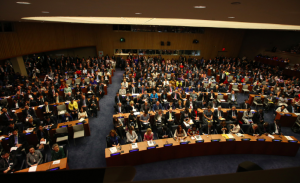Panamanian political groups, state-run organizations, and politicians have had a rough go at shaking the “corruption” label over the past few years, and it shows. People are upset, people are tired of feeling scammed, people want a change, and they’re taking action to do something about it. Corruption was the main focus (again) during the 2019 election campaign season, and will be a prime area of focus for Panama’s new president, Laurentino “Nito” Cortizo. This year, Panamanian voters showed strong support for an independent candidate who promised to separate his administration from the groups who’ve betrayed the citizens in the past. Much of the Cortizo vote, in fact, was a sort of referendum on the corruption allowed by Ricardo Martinell’s party (CD) even. The signs are there. If Panama’s government doesn’t actively push out corruption, or the perception/fear of corruption, they will not be able to reach their full potential.
Where does the perception of corruption come from?
There’s no simple answer to how or why Panamanians have a palpable distrust for politicians on the basis of corruption, but there is a precedence to justify most of it. In recent years, there have been far-reaching political and business scandals that connect people as high up as the president with unfair and illegal business practices, as well as embezzlement, and in some cases, fraud. This has caused a riff between your average citizen and the people and organizations that rule the country and its services. The riff, however, isn’t unrepairable, and of course, not all politicians or parties are corrupt. In other words, if these entities keep their word to sand firm against political corruption and scandals (especially in regards to money), they can change the country’s ire and negative perception towards the system. Will it be easy? No. Will it take time? Absolutely.
How Panama can improve and repair the corruption label
The first, and most important way Panama can improve its reputation, in this case, is by being more transparent on government business deals and finances. Locals want to see where the country’s money is being spent, why it’s being spent, and how it’s being sent, and if the government can show better results for their investments, and greater detail on how those investments are structured, it’s a great start. It will take time to rebuild the trust in public opinion needed to move away from the reputation, and many in Panama’s government are ready to do that. Another big way the government can start reversing the damage from the “corruption” reputation is to enforce consequences equally. This means enforcing the rules as they’re written, fairly between all parties. When citizens see that parties are willing to be magnanimous and unbiased about how they punish infractions, they will have more confidence in the system in general.
Outside of government, another area where the public sector can improve relations with Panama’s citizens is to reform policing. There is a certain level of distrust between the police and the average citizen, and while not as big as how citizens feel about the government, it’s still an issue. Police are actively trying to mitigate this by being more proactive with community outreach, improving the political infrastructure the police forces have to deal with, and focusing on better recruiting. All of these actions, over time, will have a massive impact on the country. The question is, will Panama’s new government step up together to make it happen.
